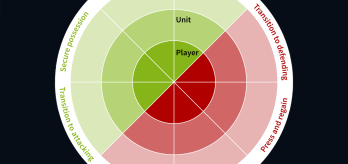After delving into talent predictors in part 1 of his presentation, Professor Höner turns his attention to the psychological characteristics that can influence talent development, and specifically to factors related to personality and cognitive skills like decision-making. To what extent are these factors linked to future success in football, and how can coaches help players develop helpful psychological traits? The session is followed by a Q&A, hosted by FIFA’s Dr Paul Bradley.
Explore which psychological characteristics are linked to the future success of young players in youth development systems. Specifically, explore the significance of personality-related factors in development and whether whether players who show advanced football-specific decision-making skills in video-based diagnostic tests are more likely to progress through academies.
Certain psychological characteristics appear to be linked to success in football; the study suggests that players motivated by the hope of success are more likely to progress, and that it is rare for talented players who later turn professional to express strong fear of failure. Young players who show advanced decision-making skills in a football context appear more likely to progress than their peers.
Psychological testing can provide tentative clues as to whether a player is more or less likely to succeed than their peers, but the tests can produce false positives and should not be used for selection purposes. Tests of all kinds should be considered a complement to the expertise of practitioners, not as a replacement for it. Coaches and sport psychologists might consider intervening to improve specific psychological attributes in players, for example to reduce fear of failure.
Watch presentation
Read summary
Part 1: Empirical evidence for the importance of personality characteristics in talent development
As Professor Höner explains, a prospective study carried out in the German FA’s talent development programme examined personality-related characteristics in young footballers, focusing on their motivation, volition, self-referential cognition and emotions. The researchers used diagnostic testing to investigate how these characteristics were expressed by youth players, and whether there was a link between players’ personality traits and the performance levels they achieved four years later. The results showed a correlation between some of these psychological characteristics and players’ progress through the system. For example, players who were motivated by the hope of success were likely to achieve a higher performance level in the future than those motivated by factors like fear of failure. The results also suggested that some characteristics were more relevant in specific phases of players’ development. For instance, competitive anxiety was a bigger factor for players making the step up to the senior professional game than it was for players progressing through youth age groups.
Part 2: Empirical evidence for the importance of perceptual-cognitive skills
Researchers often conduct video-based psychological decision-making tests, but finding empirical evidence of the importance of cognitive skills for talent development is a more difficult task. In this study, researchers overcame that barrier using a series of simulated, football-specific decision-making tasks, which were presented to the players in the form of immersive 360-degree videos using head-mounted displays. The findings indicated that future professionals were more likely to find the best solution in each scenario than players who went on to perform at lower levels of the game, underlining the importance of these specific skills during matches.
Q&A
01:22
Firstly, it is often said that mentality is more important than talent. What is your personal view on that statement, and does the data bear it out? Are the psychological predictors we’ve talked about more or less important than the motor skills discussed in part one?
05:09
How can practitioners use the diagnostic information, and particularly information about personalities, in their day-to-day work with players?
08:28
What do the key factors of psychological characteristics and environmental factors actually mean in practice?
13:08
On decision-making, I wanted to ask how players react to working with that video-based diagnostic test. Did they see any benefit from working with it?
16:33
What were the main limitations of the video-based diagnostics?
19:45
Since there seems to be some benefit from this technology, could it be used as a training tool for players?
24:24
Have you got a take-home message for practitioners on how to translate the science in this area into practice?















